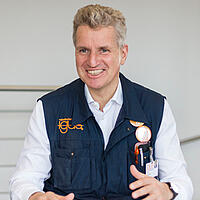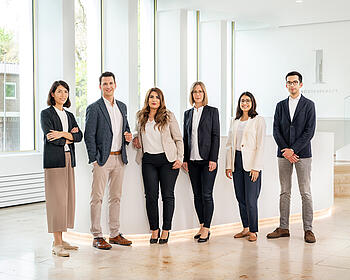Frank Blase is CEO of igus, a Cologne-based company specialising in plastics and synthetic materials. The company recently achieved a turnover of around one billion euros. A conversation about plastic bicycles, robots and a startup mentality that Frank Blase inherited from his family.
Mr Blase, your father, Günter Blase, founded the company igus with his wife Margret in 1964 in a garage in Cologne. How much courage did it take back then to start a company?
It took a huge amount of courage. My parents not only founded the company, they also didn't have a single machine or any employees at the beginning. My father, an engineer in the wood industry and long-time factory manager of a plastics company in Cologne, had set up his own business and now had a wife and two children at home who needed to be fed. So he plucked up all his courage, went to the automotive supplier Pierburg and said: "Give me your most difficult part and I'll find a solution for it."
That does indeed sound brave. What part are we talking about?
It was a valve cone for a vehicle carburator. The most knowledgeable engineers had cut their teeth on a clever solution, but my father saw it as a challenge. He wanted to approach the component in a completely different way, moulding it out of plastic using an injection moulding machine. My father then experimented until he found the perfect solution. That was certainly courageous, but in part, also stubborn and improvised.
Would you say this kind of mentality still exists today?
Absolutely. I see this kind of courage on a daily basis in our company, which has grown a lot, but also in the many startups in Cologne and the surrounding area. Lots of these startups share a common characteristic with us: an entrepreneurial spirit and the desire to make everything just a little bit better.
A lot has happened at igus since 1964. As the successor, you have turned the startup into a huge company, from a turnover of 1.4 million euros in 1983 to around one billion euros. The only thing that hasn't changed is the fact that you're based in Cologne. What keeps you in the city to this day?
The diversity and attractiveness for young people moving here. The breadth of industry, which is often underestimated from the outside and allows you to organise a very good supply chain, is certainly another positive factor. Added to this is the huge innovative spirit, which I particularly appreciate. I think Cologne shows that you don't have to go abroad to save money and improve the product. You can also do this, especially with a Cologne-based company.
You have over 4,000 employees worldwide. Where do you recruit the best Munds?
We recruit many workers from the region, directly from the universities in Cologne and surrounding region. As a company, we have also set up an adult training programme with the local Chamber of Industry and Commerce. In recent years, we have trained almost 200 adults to become skilled workers, for example in plastic injection moulding - and all of this on full pay.



